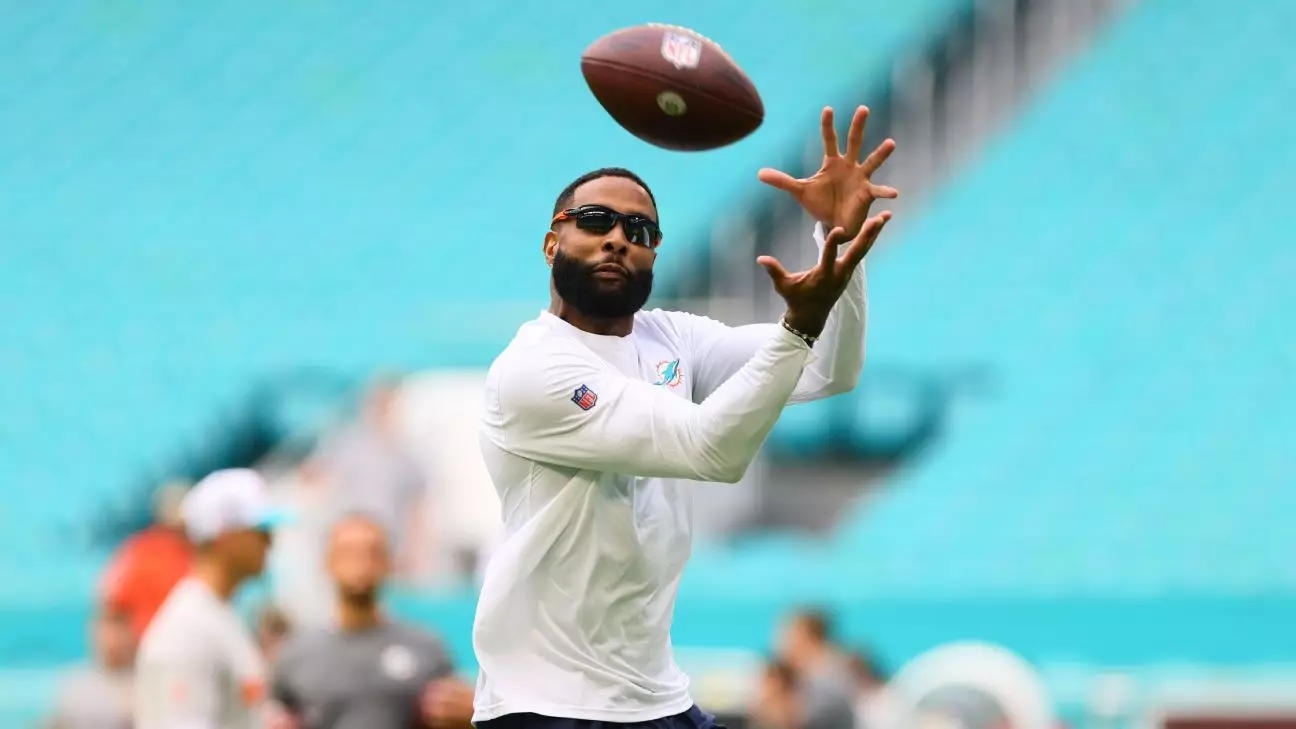The Miami Dolphins are positioning themselves for a critical matchup against the New England Patriots with the recent activation of wide receiver Odell Beckham Jr. from the physically unable to perform (PUP) list. Beckham, who has a storied career highlighted by three Pro Bowl selections, has been sidelined for the initial weeks of the season due to a knee procedure he underwent in the offseason. His journey back onto the field has been marked by determination and perseverance, contributing to a sense of urgency within the team.
Beckham joined the Dolphins in May, but his long-awaited practice debut this week signaled a turning point for both him and the franchise. After participating in consecutive full practices without setbacks, his presence is viewed as a strategic asset for a Dolphins receiving corps struggling both statistically and in terms of health. The team’s notable reliance on primary players Tyreek Hill and Jaylen Waddle—who have each surpassed 200 receiving yards—exposes the urgent need for depth in the receiving lineup.
In a direct response to Beckham’s return, the Dolphins made significant roster moves by releasing quarterback Tim Boyle. This decision reflects not just a tactical realignment but also the dynamics of roster management as Miami prepares for Sunday’s confrontation with the Patriots. Boyle will remain connected to the team, having been re-signed to the practice squad, showcasing the unpredictability and fluidity that characterize the NFL during this stage of the season.
With roster adjustments becoming a regular motif, the Dolphins’ ability to adapt will play a crucial role in their ongoing quest for victory. The team aims to break free from a frustrating three-game losing streak, which has placed additional pressure on all players, especially the offense. Beckham’s self-acknowledged readiness to accept this pressure hints at the leadership qualities he brings, poised to elevate the momentum of the squad.
As Beckham prepares to step back onto the field, it’s essential to recognize the collective nature of the challenges facing the Dolphins. With the return of key players like left tackle Terron Armstead and cornerback Kendall Fuller, who missed the previous game due to concussion protocols, the team is clearly recognizing the importance of every member during critical games. However, the absence of safety Jordan Poyer, due to a shin injury, underscores that even as they gain reinforcements, vulnerabilities still exist.
Beckham’s enthusiasm mirrors the prevalent mindset within the Dolphins’ locker room; the pressure on the offense is palpable, but it’s mixed with a sense of urgency rather than panic. His acknowledgment that “there’s no time to panic” conveys a message of resilience and collective action, resonating with a team that has high aspirations yet faces the daunting task of regaining its footing after a disappointing start.
As the Dolphins gear up for their game against the Patriots, the storyline surrounding Beckham’s return is more than just about one player—it symbolizes hope for rejuvenation and the possibility of overcoming adversities that have plagued the team. The urgency to make plays and produce points lies not only on Beckham’s shoulders but resonates throughout the entire roster, setting the stage for an intense showdown that may define the Dolphins’ season trajectory. Beckham’s activation is a pivotal moment for the Dolphins, blending personal battle with collective resolve as they seek redemption and resurgence in the NFL landscape.


Leave a Reply